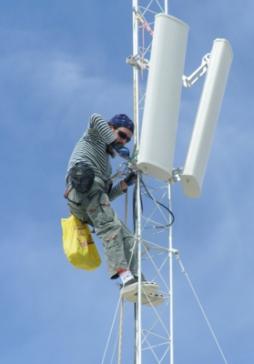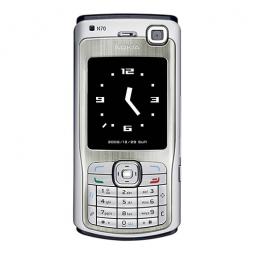mobile networks
Posted by EKStallings on Dec 19, 2011
Beyond ICT4D: New Media Research in Uganda data sheet 584 Views
Author:
Balunywa , Ali, Guido van Diepen, Wouter Dijkstra, Kai Henriquez, Ben White
Abstract:
This paper is a collection of five ethnographic reports examining the role of ICT in Uganda. The first is not particulalrly mobile focused and looks at how those who have access to internet in Uganda use it. The second report is about the ways ICT is changing print media. The third report focuses on the the opportunities ICT present for civil society and non-governmental groups. The next report outlines the way the ICT sector in Uganda was developed. The last report examines ways that ICT may be used in government accountability.
Posted by kelechiea on Jul 18, 2011
Cell vs. Internet: The Impact on Democratization in Africa data sheet 2906 Views
Author:
Patience Akpan-Obong, Ph.D., Nicholas O. Alozie, William Foster, Ph.D.Ph.D.,
Abstract:
This paper presents an empirical assessment of the impact of information and communication technologies (ICTs) on political development in sub-Saharan Africa. The analysis, based on the Mo Ibrahim indicators of democracy in Africa for 2008, reveals a close alignment between ICTs in Sub-Saharan Africa and democratization – or political development broadly defined.
Our examination of the data demonstrates that elevated levels of phone, computer, and Internet diffusion are associated with political development, although only the effect of the phone remains once other variables are specified. The phone is the most robust of all individual factors explaining variations in political development. This may be explained by the fact that all strata of society can use cell phones, while the Internet is primarily used by the elite.
Posted by VivianOnano on Jul 15, 2011
Telecom Regulatory Authority of India: Consultation Paper on Certain Issues relating to Telecom Tariffs data sheet 2015 Views
Author:
Bhawa, Mahanagar Doorsanchar.
Abstract:
Service providers periodically publish different tariff offers with the objective of both customer acquisition and customer retention. Transparency in the provision of telecommunication services and tariff offers has always been and continues to be of prime concern to the Authority. TRAI has in the past taken several steps to enhance transparency in tariff offers.
The Authority, however, is receiving several complaints and representations from consumers and their representatives seeking further effective transparency measures. In view of the increased competition as well as the spread of telecom activity to rural areas, the relevance of having a more transparent regime for tariff offerings cannot be overemphasised. At the same time, service providers and their associations have also raised certain concerns. This consultation paper brings out various issues that have a bearing on telecom tariff offers.
Posted by admin on Jun 07, 2011
[This post was written by Robert Goodier and originally appeared on Engineering for Change. It is reposted here with permission.]
Three men who believe that cellphone service should be cheap and accessible to everyone have found a way to make it happen. The creators of OpenBTS, the open-source cellphone network, launched a startup and have delivered cheap cellphone networks to the world's biggest mobile tech corporations, governments and other clients on every continent. (Yes, even Atarctica—the Australian base is connected via OpenBTS.)
As we reported last year, OpenBTS is a network built on open-source software and hardware that works seamlessly with the average cellphone. With smart coding and decentralized call processing, the system has reduced the hardware needed and cuts the cost of installing and running a cellphone network to about one-tenth that of a traditional setup.
And, importantly for developing countries, the base tranceivers (the gear in the cell towers) are energy sippers that can run on PV cells. The bottom line: The whole network can reduce the cost of service to about $2-3 per month for subscribers.
We spoke with Glenn Edens, a co-founder of Range Networks, with a resume that includes such titles as former head of Sun Lab at Sun Microsystems, former president of AT&T Strategic Ventures, Chief of Strategic Technology at Hewlett-Packard and others. Edens summed up the last six months at Range Networks and told us what lies ahead for the startup.
Posted by MarkWeingarten on Feb 22, 2011
Towards End-to-End Security in Branchless Banking data sheet 1548 Views
Abstract:
Mobile-based branchless banking has become one of the key mechanisms for extending financial services to disenfranchised populations in the world's developing regions. One shortcoming of today's branchless banking systems is that they rely largely on network-layer services for securing transactions and do not implement any application-layer security. Recent attacks on some of the most popular branchless banking systems show that these systems are not end-to-end secure.
In this paper, we make the case for designing mobile-based branchless banking systems which build security into the application layer of the protocol and guarantee end-to-end security to system users. Our main contribution is a threat model which effectively captures the goals of end-to-end authenticated transactions in branchless banking. This model, besides incorporating the obvious external threats to a protocol, also accounts for the possibility of insider attacks - those mountable by banking agents or other human intermediaries in the system. We then provide recommendations for solution design based on the security requirements of our model and the infrastructural constraints under which branchless banking systems operate.
Posted by AnneryanHeatwole on Oct 28, 2010
The Mobile Minute has info on social networking via mobiles, interactive mobile lesson plans in South Africa, a new ITU study that estimates more than 90% of the world's population has access to mobile networks, the Red Cross' work to battle a cholera outbreak in Haiti with SMS health updates, and the launch of a mobile money transfer pilot in the Philippines.


